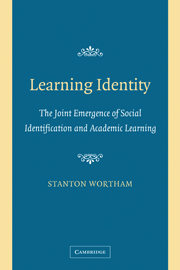Book contents
- Frontmatter
- Contents
- Acknowledgements
- 1 Self/Knowledge
- 2 Social Identification and Local Metapragmatic Models
- 3 Academic Learning and Local Cognitive Models
- 4 Tyisha Becoming an Outcast
- 5 Maurice in the Middle
- 6 Denaturalizing Identity, Learning and Schooling
- Appendix A Abbreviations of Names
- Appendix B Transcription Conventions
- References
- Index
1 - Self/Knowledge
Published online by Cambridge University Press: 05 June 2012
- Frontmatter
- Contents
- Acknowledgements
- 1 Self/Knowledge
- 2 Social Identification and Local Metapragmatic Models
- 3 Academic Learning and Local Cognitive Models
- 4 Tyisha Becoming an Outcast
- 5 Maurice in the Middle
- 6 Denaturalizing Identity, Learning and Schooling
- Appendix A Abbreviations of Names
- Appendix B Transcription Conventions
- References
- Index
Summary
In functioning classrooms, as paradigmatic sites of rational activity, we expect to find focused and productive cognitive processes. Irrational and irrelevant things happen in classrooms, of course, but when teachers and students are doing the primary business of schooling – reading, writing, discussing, experimenting, calculating – we expect to find subject matter, argument, evidence and academic learning. As more sociological and anthropological studies of classroom practice have been done over the past three or four decades, however, it has become clear that social identification, power relations, interpersonal struggles and other apparently non-academic processes also take place during the primary business of schooling (e.g., Cazden, John and Hymes, 1972; Gee, 1989; Varenne and McDermott, 1998). Furthermore, these apparently non-academic processes cannot easily be separated from the academic activities that go on in classrooms. Subject matter, argument, evidence and academic learning overlap with social identification, power relations and interpersonal struggles (e.g., Leander, 2002; Lemke, 1990; Mehan, Villanueva, Hubbard, Lintz and Okamoto, 1996; Wortham, 1994).
Although many have pointed out the co-occurrence of academic and non-academic activities in classrooms, significant dispute remains about how to conceptualize relations between the two. Some continue to revel in demonstrations of non-academic activities in classrooms, claiming that ideologies of academic learning merely distract from the real social business of schooling. Some treat the two types of activities as concurrent but separate and continue to maintain that schooling is primarily about academic learning. More promising accounts have begun to explore the complex interrelations among academic and non-academic activities.
Information
- Type
- Chapter
- Information
- Learning IdentityThe Joint Emergence of Social Identification and Academic Learning, pp. 1 - 28Publisher: Cambridge University PressPrint publication year: 2005
